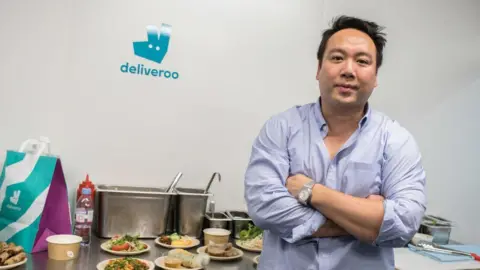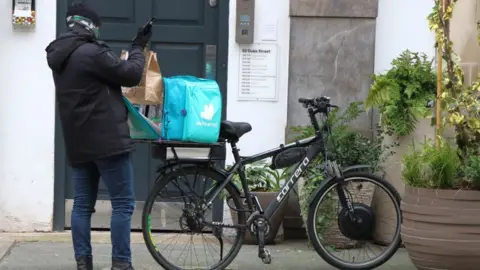Deliveroo boss Will Shu: 'I was never into start-ups'
 Getty Images
Getty Images"I never set out to be a founder or a CEO. I was never into start-ups," says Will Shu, founder of food delivery chain, Deliveroo.
His comments came as the firm set out plans to issue shares to the public which could value it at about £7bn.
Deliveroo has not yet made a profit and it reported a £223.7m loss for last year, despite a surge in sales.
The float will see the busiest riders share in a £16m fund, and customers will also get the chance to buy shares.
Deliveroo is making £50m worth of shares available to customers who will be given the opportunity to buy up to £1,000 worth of shares each, although if demand is high they may see their orders scaled back.
Mr Shu's letter, contained in the official notice of the intention to float, also says: "I'm not one of those Silicon Valley types with a million ideas. I had one idea.
"At the end of the day, I started the business because I wanted something better than what was available to me.
"Today, the business is so, so much bigger than I ever would have thought possible."
 Getty Images
Getty ImagesDeliveroo said that last year, its gross transaction value - the total amount of transactions it processes on its platform - jumped by 64.3% to £4.1bn from £2.5bn in 2019.
However, the business remains loss-making, although its underlying loss for 2020 reduced to £223.7m from £317.3m in 2019.
Demand for takeaway meals has soared during the coronavirus pandemic, after lockdown measures were first implemented a year ago and restaurants have been forced to close.
Restrictions on hospitality businesses in England are currently set to start to ease on 12 April at the earliest.
Anna Macdonald, fund manager at Amati Global Investors, told the BBC's Today programme: "Losses have actually been mounting at Deliveroo over the last few years, but given the environment for tech listings at the moment, that doesn't seem to put too many investors off who are prescribing quite a hefty valuation for the company.
"There's no doubt that it's done tremendously well during lockdown and the founder Will Shu says in the last six months to the end of 2020 it was operating profitably. But, yes, there's a good deal of hope in the share price valuation."
As part of the flotation, riders in Deliveroo's 12 markets who have worked with the firm for at least a year will be paid a bonus of either £10,000, £1,000, £500 and £200 depending on the number of orders they have delivered.


How can a company that lost over £200m in a year when trading conditions could not have been more favourable be worth so many billions?
That's the question many will be asking when trying to work out why Deliveroo is expected to hit that valuation when it makes its stock market debut in London.
The answer, of course, is that stock markets are all about pricing future profits, or at least in Deliveroo's case, the hope of future profits. The online food delivery service has grown quickly during the pandemic - sales last year were more than £4bn, nearly two-thirds up on 2019 - and it has been able to reduce its annual loss.
It is also investing heavily in technology and geographical expansion, and is eager to show investors that it has now honed its model and operating systems to the point that they can be quickly introduced into many more markets.
This promise of rapid growth and eventual bumper profits is what will drive Deliveroo's share price when it eventually comes to market. The challenge for its management team, led by founder Will Shu, is turning the promise into reality.

Share structure
The shares will be listed on the London Stock Exchange, where Will Shu is planning to maintain a firmer grip on how the company is run than has been traditional for London-listed companies.
Under a proposed dual-class share structure, each share Mr Shu will hold will carry 20 times the voting power of ordinary shares.
A recent government-commissioned review of the UK's listing rules recommended a number of measures to make the country a more attractive place for companies to float.
The review, led by former European Commissioner Lord Hill, recommended allowing companies with dual-class share structures to be allowed in the premium listing segment of the London Stock Exchange, which allows them to be included in FTSE indexes. A decision on any changes to the current system will be made by the Financial Conduct Authority but will not come until the end of this year.
Major tech companies such as Facebook and Google-owner Alphabet have so-called dual-class shares.
Susannah Streeter, share analyst for stockbrokers Hargreaves Lansdown, said that because of the proposed dual-class share structure, people "need to be aware if they invest under these terms they don't have the same voting rights as they would do if they owned shares in other companies listed on the London market".
She added that there were other factors for potential investors to consider.
"Competition in the sector is fierce, and Deliveroo competes with Uber Eats, Just Eat and a host of others," she said.
"Profitability can be tough and margins tend to be slim thanks to competition and high variable costs.
"There is of course a risk that demand for home deliveries will wane once the pandemic has eased. It's likely that the public will be desperate to eat out as soon as they can."
